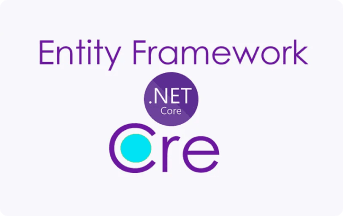entity-framework-core

Entity Framework Core
Microsoft has been making efforts to position ASP.NET Core as an excellent choice for software development. Several indicators demonstrate notable progress, including benchmarks available on their website. According to these benchmarks, ASP.NET Core exhibits superior performance compared to NodeJS and Java. It is capable of processing a higher number of requests per second than NodeJS and Java.
Entity Framework Core is an open-source Object-Relational Mapper (O/RM) that receives contributions from both Microsoft and the community. It is a cross-platform version of the well-known Entity Framework.
Entity Framework Core has evolved at a faster pace compared to its predecessor, Entity Framework. It introduces several new features that are not available in the previous version. This rapid evolution has allowed Entity Framework Core to provide enhanced functionality and improved performance.
Entity Framework Core
Entity Framework Core (EF Core) is a library developed and maintained by Microsoft. Unlike Entity Framework, EF Core is open source, and this approach enables other people and organizations to contribute to the project. This impacts a faster evolution of EF Core compared to its predecessor. The involvement of the community has played a crucial role in introducing new features, improvements, and bug fixes to EF Core.
EF Core provides a straightforward and clean approach for ASP.NET Core applications to access and store data in databases.
Entity Framework Core (EF Core) is a Object-Relational Mapper (O/RM) designed as a lightweight, open-source, cross-platform, and extensible version of Entity Framework. A object-relational mapping (ORM) reduce the need for manual SQL queries and database management tasks, making the data access layer more streamlined and developer-friend. EF Core includes several additional features, such as:
DbContext pooling — allows for the reuse of context instances. Each context instance is configured with several internal services and objects required to perform its tasks, and reusing them can result in performance gains in high-performance scenarios.
Alternate keys — allow the definition of columns with unique values, in addition to primary keys.
Global query filters — are filters applied globally, which restrict the data returned by a query based on a condition. This feature simplifies the application code, reduces the risk of incorrect data access.
Entity Framework Core and database management systems
EF Core supports various database management systems such as Oracle, SQL Server/Azure SQL Database, SQLite, MySQL, PostgreSQL, Azure Cosmos DB and In-memory (for testing).
Important concepts in applications with EF Core
Applications that use EF Core employ certain concepts, such as:
Database Context — It is a class that maps database objects and application objects, configurations, and data initialization. The Database Context acts as a bridge between the application and the database to retrieve and persist data.
Model — It is the class that is mapped to a table for retrieving or persisting data. The model is a C# class with additional configurations. There are two approaches to configure the models:
1. Data Annotations — This approach involves using attributes directly in the model class to define mappings, relationships, and constraints.
2. Fluent API configurations — This approach involves using the fluent API methods to configure mappings, relationships, and constraints in a separate configuration class.
Share
Avenida Ilha de São Vicente, Palmarejo
Praia
Cabo Verde




